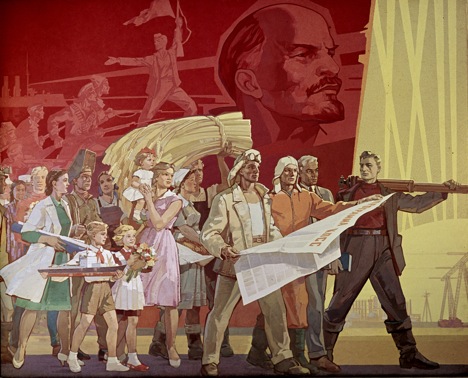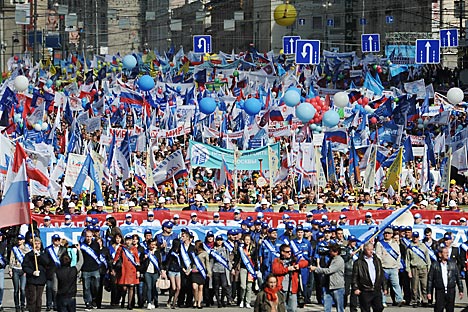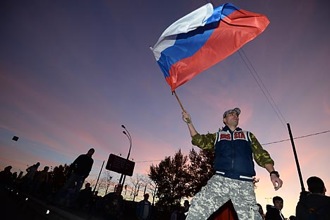The spirit of May Day

A May Day poster from yesteryear. Source: RIA Novosti
There was a lot to like about the Soviet Union, despite its obvious flaws. For starters, the role the country played in promoting gender equality in a region with strong patriarchal traditions. The concept of dignity of labour was one of the strong values of the state and transformed the highly class conscious society of the Russian Empire into a far more egalitarian one. Although for many of the nouveau riche of Moscow, the May Day weekend is just another occasion to spend time on an expensive European mini-vacation, the holiday is still sacred to millions in the country.
One of the utopian socialist principles was the right of every worker to live a dignified life and in all fairness, the Soviet Union had excellent housing, healthcare and social security systems. The fall of communist governments across Europe gave a fresh impetus in the capitalist world to reduce any sense of equality and the neo-capitalist agenda is not very far from what monarchs of the 19th century wanted.
Globally, we are faced with a situation where the elite, or the 1 percent as they are called are controlling governments, foreign policies and hoarding wealth, while keeping the remaining 99 percent relatively poor. Wars are waged over natural resources and untold misery is passed off as “collateral damage.” The post-Communist world order looks to make sure that the world’s resources stay in the hands of the few.
I am not anti-capitalism but I think the system needs some sort of checks and balances lest a vast majority of the people suffer for the benefits of the few. Around the world, it is becoming more and more expensive to live a healthy lifestyle. While global prices of fruits and vegetables keep rising, junk food and fast food become more easily available and affordable. Coconut water on a Mumbai beach costs forty rupees or 80 cents, while a bottle of cola costs 15 rupees. So what would a poor or even middle class person prefer? The unhealthy sugar-filled carbonated beverage heavily advertised by a local celebrity or something that is looked down upon as a relic of a village life and costs almost three times as much?
It is very much in the interests of the multinational companies to dump factory-produced food to global consumers at a cheap price and then ensure that people dependant on them end up leading unhealthy lifestyles that incur a fortune in healthcare costs that go to the coffers of the medical and pharmaceutical industries. We are entering an age where children are getting adult diseases since they spend more time with gadgets than playing out in the parks.
As large parts of the world celebrate May Day, even a small amount of introspection can help the 99 percent see that the elite’s view of the world calls for wiping out a middle class and putting them in the same bracket as the working class. Those who defy this elitist ultra-capitalist system are heavily criticised by a media that runs on advertising by the multinational companies run by the one percent. The late-Hugo Chavez, who was a good friend of Russian President Vladimir Putin, showed us that high GDP growth rates are not necessarily an indicator of economic progress. The leader of the Bolivarian Revolution was responsible for drastically reducing poverty in his country. This article in The Guardian describes how the percentage of households in poverty in Venezuela fell from 55 percent in 1995 to 26.4 percent in 2009. The article also explains how the unemployment rate when Chavez was sworn into office was 15 percent and by June 2009 fell to 7.8 percent. The country’s public debt dropped from 73.5 percent of GDP in 1998 to 14.4 percent in 2008. All this happened in what Western economists termed a stagnant economy. Chavez’s protégé Evo Morales in Bolivia has also ensured that the outward flow of wealth to the north was arrested. Of course, his literacy, anti-poverty and anti-racism campaigns are in no way popular with the 1 percent.
It may not necessarily be possible to implement the policies of Chavez in Russia or the other BRICS countries, but given that all most of the members of the grouping suffer from stark inequalities that only seem to be widening, they seriously need to look at some kind of new order where the multinationals of the world won’t just be able to exploit their resources.
While many of us enjoy the long weekends and nice weather in the northern hemisphere, May Day is as good an occasion as any to ponder over how the world order is evolving. Do we want a more egalitarian world or are we satisfied with the global elite’s wanton exploitation and destruction of the planet as long as it doesn’t immediately and directly affect us for now?
All rights reserved by Rossiyskaya Gazeta.
Subscribe
to our newsletter!
Get the week's best stories straight to your inbox

